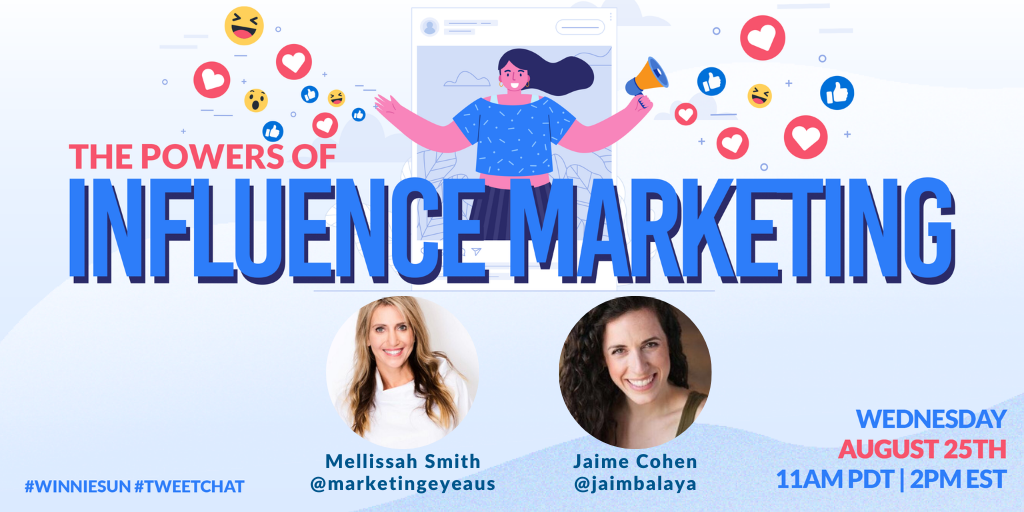Influence Marketing
To stay updated for more content like our Twitter Chats, follow @WinnieSun! Have a question for Winnie? Use the #AskWinnie to get your questions answered!
In this day and age, social media influencers have risen to such prominence in the marketing landscape that 75% of brands plan to dedicate a budget to influence marketing in 2021, according to The State of Influencer Marketing 2021: Benchmark Report.
Influence marketing’s value to a business depends on a variety of factors, including the choice of ambassador, the type of campaign, and the amount of funding invested, which varies from one company to the next. Thus, it’s important for your business to know the ins and outs of influence marketing so you can find the most effective strategy for your needs.
To help you become more familiar with this popular type of marketing, we’ve invited expert panelists and influencers Mellissah Smith @marketingeyeaus and Jaime Cohen @jaimbalaya to share their insight on what makes influence marketing so valuable to businesses and how to make the most of it for your brand.
Missed the Tweet Chat? Here’s a recap:
Q1. Why use influence marketing, and what is its purpose? How do you know if you would benefit from working with an influencer?
Mellissah Smith: For every $1 you spend on #influencermarketing a ROI of $8 can be expected. Very few areas of #marketing have that type of ROI. Using #influencers just makes sense to marketing strategies for businesses that want to expand their footprint. Whether you are B2B or B2C – your #business will benefit from #influencers – you just need to know how to find the right influencers for your brand.
Jaime Cohen: Working with influencers who have a strong audience is a great way to sell products and services. These influencers have built trust with their audiences who go to them for advice on products like yours. Or want the products simply because the influencer has them. Search for influencers who promote products/services in your niche. Then take a look at companies they’ve collaborated with, reach out to them and ask about their experience. The best information comes directly from the source.
***
Q2. How do you set goals / expectations when planning an influence marketing campaign? What trackable ROI and non-trackable results can you anticipate to come from working with influence marketing?
Mellissah Smith: Be realistic with goals and know the difference from #branding and #leadgen or #sales. Use metrics that are readily available online to determine realistic ROI on influencer marketing. Gut instinct doesn’t work. Invest in technology like @socialsprout to manage your #influencer marketing campaign and track results. You can track impressions, sharing, spikes in following and website traffic.
Jaime Cohen: Don’t be blinded by the number of followers, look at the percentage of engagement. If an influencer has 1 mil followers but only gets a couple comments and 100 likes per post, that’s not an engaged audience.
***
Q3. How do you start working with an influencer? What are the most effective methods for finding your industry influencers? How do you determine what type of influencers and platforms would be a best fit for your brand or business?
Mellissah Smith: Use technology to work out who are the right influencers for your brand. Remember, many influencers buy fake followers and likes – so use tech to weed them out. There are many agencies for #influencers that are good but do your homework. We use the @roboticmarketer dashboard which has AI-powered sorting of influencers to determine the best influencers per topic. It's important to focus on influencers that actually can reach your potential customers -- so focus on who is #following
Jaime Cohen: Agencies can be very helpful. Especially Sara Grosz at @mutesix! Influencer platforms can be helpful as well like http://Obvious.ly. Relationship building is powerful. Doing research and engaging with influencers on your own creates a more personal touch! Understand where your audience spends the most time AND how they interact with influencers in that space.
***
Q4. What are the best tips for partnering with an influencer? Rather than pushing a strict script on them, what are the best methods to collaborate on a creative approach they feel will resonate with their audience base to introduce your business? How do you establish clear terms and timelines for your partnership?
Mellissah Smith: Have an on-boarding program in place and an #influencer deck. Don’t leave anything to chance. Key messaging and brainstorming with influencers on what content ideas they have for your brand, before going live. Set expectations upfront. Put everything in writing. Avoid “new” influencers who don’t have experience in maximizing the potential of your brand with them as an influencer. P.S. Don't be afraid to use legal contracts when working with influencers.
Jaime Cohen: Create crystal clear guidelines while allowing creative freedom. Natural & successful collaborations fit in with the influencer’s normal posting behavior. If you push a script, the audience will feel the lack of authenticity & the results will reflect that.
***
Q5. Macro, Nano, & Micro-Influencers, oh my! What differences can you expect from working with and executing a micro or nano influencer strategy vs a larger scaled influence marketing? Do you think it’s easier? Does that make this a better place to start for beginners? Why or why not?
Mellissah Smith: Influencers with 1k to 5k followers tend to be more effective and show a higher ROI. They also tend to be more authentic. Larger scale influencers are hit and miss. Think about what you are selling and what would be a fair ROI based on the budget you allocate. If you are trying #influencer marketing for the first time, go small – you can always build it up over time. Learn what works and what doesn’t for your brand.
Jaime Cohen: Surprisingly, some of the best campaigns are with micro influencers. Smaller, more engaged audiences often outperform enormous audiences constantly and can be more cost effective.
***
Q6. What is the difference between an “always-on” strategy vs a one-off campaign? How do you build an always-on strategy differently? What are the pros and cons of this method?
Mellissah Smith: Always "on" strategy is about building an influencer community. Companies like @Adobe and #moosetoys do a really good job of forming a community around their #brands One-off strategies are good if there is a particular product or launch that needs a "push." The pros for "always on" is evident if you are managing the influencer community well. They will not only stay loyal but also tend to "push your brand" year-round. To be "always on" a nurturing campaign and regular communications is necessary
***
Q7. How do you think the influence marketing industry has changed over the last year or so? How do you expect it to continue to evolve?
Mellissah Smith: It's changed dramatically. So much of the #marketing budget has gone to digital & #influencers are taking on #brands that in a normal market, they may avoid. There is an authenticity issue that consumers are starting to take into account. Think @KimKardashian
Jaime Cohen: It has become much more powerful over the past year! We’re spending more time online & many look to influencers when it comes to decision making. People trust a video or post from an influencer now more than a written review. They want to see things in action. As more influencers come onto the scene consumers/followers need to be cautious. I've seen influencers promote products that I KNOW don’t work. Eventually it will catch up to them. Influencers: don’t promote products before you’ve vetted them thoroughly!
***
Q8. What marketing advice had the biggest impact on your business? What resources would you turn to if you wanted to learn more and stay on the pulse of influence marketing?
Mellissah Smith: Throw the question back at them. What are they willing to pay? At least this gives a negotiation starting point.
Jaime Cohe: My best advice is trust the engagement not the number of followers! Is the influencer's audience having a conversation around the product/service? Are they asking questions? I highly recommend following @sarah_grosz on LinkedIn and instagram. She is the queen of the business on influencer marketing and has built a huge program at @mutesix
Although influence marketing is everywhere nowadays, it’s important to understand the necessity of developing a campaign that suits your brand, which will prove to be much more fruitful than if you were to merely mirror what other companies do. We hope that the tips that Mellissah and Jaime shared will help you create an influence marketing plan that’s worth your while.


